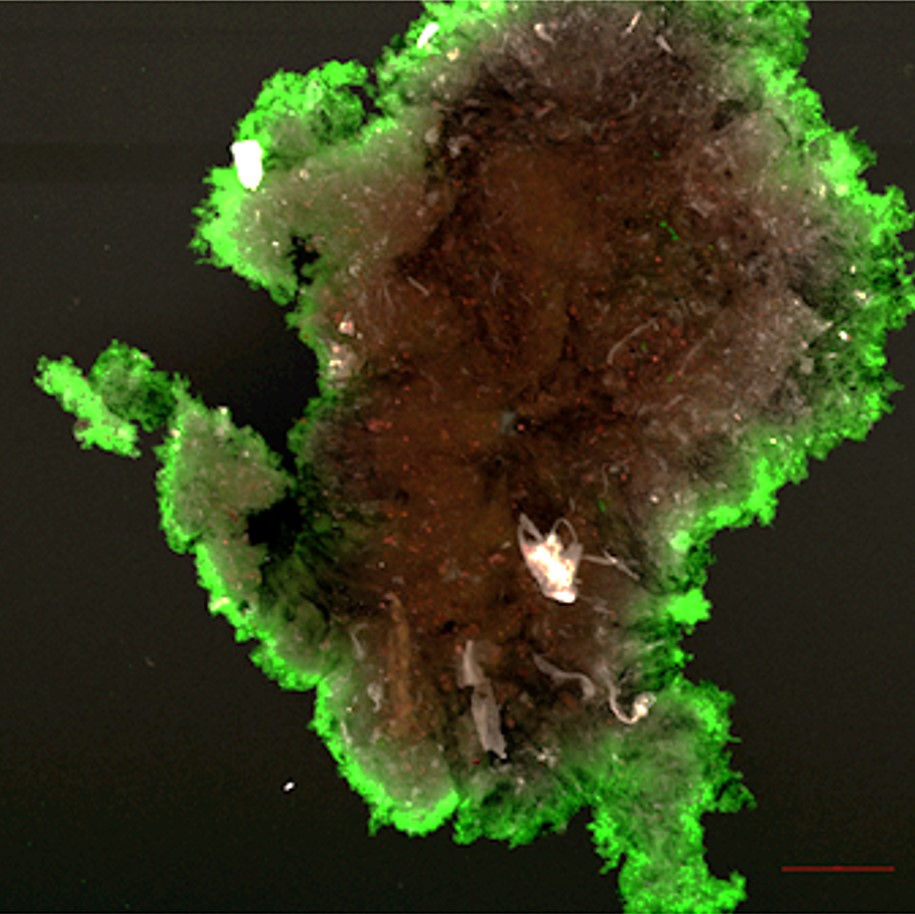Thursday, 16 February 2023
Changing the structure of a dietary fibre commonly found in a range of food products has been found to promote healthy gut bacteria and reduce gas formation, a finding that could help people with intolerances to fibre and irritable bowel conditions.
A team of scientists from the University of Nottingham, Quadram Institute Biosciences and the University of East Anglia examined psyllium, a type of natural dietary fibre that is used in a range of products including cereals and yoghurts. They showed that the physical state of the fibre has a major impact on gas production which often is linked to bowel discomfort. The findings have been published in Food Hydrocolloids.
 psyllium gel-like particles at 72h fermentation with the colonic Bifidobacteria (yellow) localised at the edge of the psyllium particles and Lactobacilli (orange) spread throughout the gel
psyllium gel-like particles at 72h fermentation with the colonic Bifidobacteria (yellow) localised at the edge of the psyllium particles and Lactobacilli (orange) spread throughout the gel
The team performed in vitro fermentation experiments seeded with human stool. They conducted analysis of fermentation products and evaluated the impact of different structures on the broad categories of microorganisms.
Dr Gleb Yakubov, Associate Professor in Food Physics at the University of Nottingham was one of the lead researchers on the study, he explains: “Although fibre is an important part of any diet, for many people it can cause bowel discomfort and for people with IBS or IBD fibre can be a trigger. This is because some foods cause bacterial interactions in the gut that create gas that can lead to pain or discomfort. Our study shows that the physical state of the fibre has a major impact on gas production by creating beneficial compounds that promote the creation of the good bacteria in the gut.”
Psyllium fibre comes from the seeds of Plantago ovata plants, known by many common names such as blond plantain. These seeds produce a jelly-like material called mucilage, which comes in a variety of shapes and forms and these feature long-chain sugars, called polysaccharides. It is these polysaccharides that lead to the production of beneficial short-chain fatty acids that positively contribute to gut health and systemic metabolism. This study shows that different physical states of fibre impact the way dietary fibre breaks down and that microbes ‘colonise fibre’ during fermentation.
These findings show that there are new opportunities for designing targeted structures using psyllium, either through seed processing or selective breeding, to achieve new fibre materials with clear clinical benefit above that of unrefined psyllium powders aiding in the treatment of gastrointestinal discomfort.
Research is already underway at the University if Nottingham with the School of Medicine to use this new knowledge to create and test psyllium-mimicking materials as medical nutrition which could provide a source of fibre for people with some bowel conditions and trials will be starting in the Spring.
Story credits
More information is available from Dr Gleb Yakubov on Gleb.Yakubov@nottingham.ac.uk
Notes to editors:
About the University of Nottingham
Ranked 97 in the world and 17th in the UK by the QS World University Rankings, the University of Nottingham is a founding member of Russell Group of research-intensive universities. Studying at the University of Nottingham is a life-changing experience, and we pride ourselves on unlocking the potential of our students. We have a pioneering spirit, expressed in the vision of our founder Sir Jesse Boot, which has seen us lead the way in establishing campuses in China and Malaysia - part of a globally connected network of education, research and industrial engagement.
Nottingham was crowned Sports University of the Year by The Times and Sunday Times Good University Guide 2024 – the third time it has been given the honour since 2018 – and by the Daily Mail University Guide 2024.
The university is among the best universities in the UK for the strength of our research, positioned seventh for research power in the UK according to REF 2021. The birthplace of discoveries such as MRI and ibuprofen, our innovations transform lives and tackle global problems such as sustainable food supplies, ending modern slavery, developing greener transport, and reducing reliance on fossil fuels.
The university is a major employer and industry partner - locally and globally - and our graduates are the third most targeted by the UK's top employers, according to The Graduate Market in 2024 report by High Fliers Research. Alongside Nottingham Trent University, we lead the Universities for Nottingham initiative, a pioneering collaboration between the city’s two world-class institutions to improve levels of prosperity, opportunity, sustainability, health and wellbeing for residents in the city and region we are proud to call home. More news…